Plot summary
Wisecracking Joe Miller (Ray Walker) makes it to the big time in radio.
When he gives his girlfriend Janet (Julie Bishop) her big break, she becomes an even bigger star. He feels like the joke's on him, when she starts going out with his friend George (Lorin Raker); and, he turns to booze, for comfort.
Whether Joe can crawl back up, out of the bottle; or, if Janet, or the sponsors and audience will take him back, remains to be seen.

This is a list of notable events in music that took place in the year 1929.
This is a list of notable events in music that took place in the year 1926.

Lew Brown was a lyricist for popular songs in the United States. During World War I and the Roaring Twenties, he wrote lyrics for several of the top Tin Pan Alley composers, especially Albert Von Tilzer. Brown was one third of a successful songwriting and music publishing team with Buddy DeSylva and Ray Henderson from 1925 until 1931. Brown also wrote or co-wrote many Broadway shows and Hollywood films. Among his most-popular songs are "Button Up Your Overcoat", "Don't Sit Under the Apple Tree", "Life Is Just a Bowl of Cherries", "That Old Feeling", and "The Birth of the Blues".
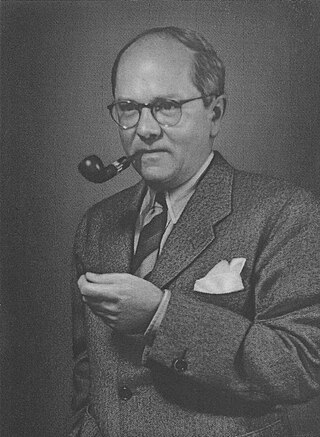
Richard Armstrong Whiting was an American composer of popular songs, including the standards "Hooray for Hollywood", "Ain't We Got Fun?" and "On the Good Ship Lollipop". He also wrote lyrics occasionally, and film scores most notably for the standard "She's Funny That Way".
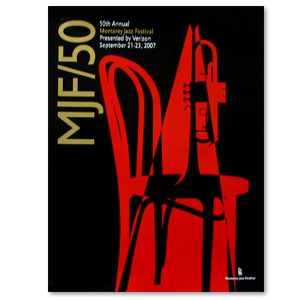
The Monterey Jazz Festival is an annual music festival that takes place in Monterey, California, United States. It debuted on October 3, 1958, championed by Dave Brubeck and co-founded by jazz and popular music critic Ralph J. Gleason and jazz disc jockey Jimmy Lyons.
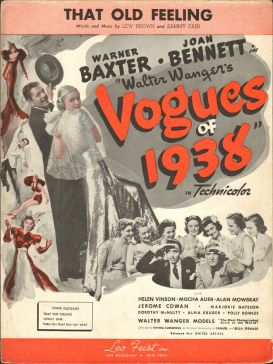
"That Old Feeling" is a popular song about nostalgia written by Sammy Fain, with lyrics by Lew Brown. It was published in 1937.
Harry Akst was an American songwriter, who started out his career as a pianist in vaudeville accompanying singers such as Nora Bayes, Frank Fay and Al Jolson.

Ray Anthony is an American retired bandleader, trumpeter, songwriter and actor. He is the last living member of the Glenn Miller Orchestra.

The Big Broadcast of 1936 is a 1935 American comedy film directed by Norman Taurog, and is the second in the series of Big Broadcast movies. The musical comedy starred Jack Oakie, Bing Crosby, George Burns, Gracie Allen, Ethel Merman, The Nicholas Brothers, Lyda Roberti, Wendy Barrie, Mary Boland, Charlie Ruggles, Akim Tamiroff, Amos 'n' Andy, Bill "Bojangles" Robinson, and Argentinian tango singer Carlos Gardel.
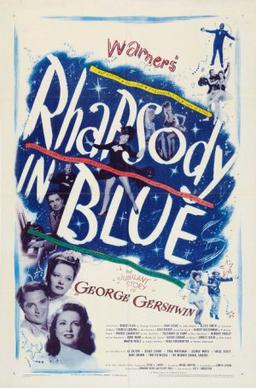
Rhapsody in Blue, subtitled The story of George Gershwin is a 1945 American biographical film about composer and musician George Gershwin, released by Warner Brothers. Robert Alda stars as Gershwin. Joan Leslie, Alexis Smith, Hazel Scott, and Anne Brown also star, while Irving Rapper directs. The film was released in the United States on September 22, 1945.
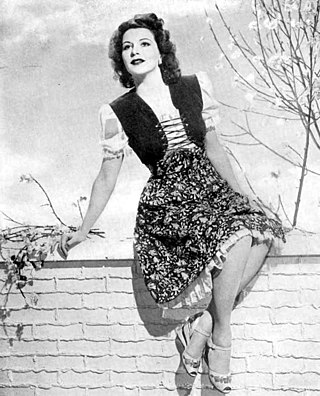
Julie Bishop, previously known as Jacqueline Wells, was an American film and television actress. She appeared in more than 80 films between 1923 and 1957.

Mr. Wonderful is a musical with a book by Joseph Stein and Will Glickman, and music and lyrics by Jerry Bock, Larry Holofcener, and George David Weiss.

Kid Boots is a musical with a book by William Anthony McGuire and Otto Harbach, music by Harry Tierney, and lyrics by Joseph McCarthy. The show was staged by Edward Royce.

Two Girls and a Sailor is a 1944 American musical film directed by Richard Thorpe and starring Van Johnson, June Allyson and Gloria DeHaven. Set on the American homefront during World War II, it's about two singing sisters who create a lavish canteen to entertain members of the military, thanks to financial contributions from a mysterious donor. The picture features a host of celebrity performances, including Jimmy Durante doing his hallmark "Inka Dinka Doo", Gracie Allen, and Lena Horne. Richard Connell and Gladys Lehman were nominated for the Academy Award for Best Original Screenplay.

Hello Down There is a 1969 American comedy-adventure film starring Tony Randall and Janet Leigh that was released by Paramount Pictures. It was produced by George Sherman and Ivan Tors and directed by Jack Arnold and Ricou Browning. The screenplay was written by John McGreevey and Frank Telford.

New Faces of 1937 is a 1937 American musical film directed by Leigh Jason and starring Joe Penner, Milton Berle and Harriet Hilliard. Its plot is similar to The Producers (1968). Intended as the first film of an annual RKO Pictures revue series, poor reception ended plans for future productions.
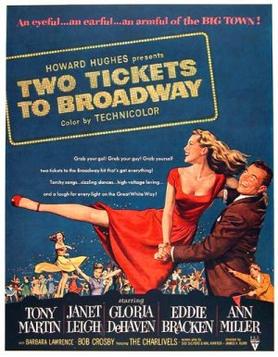
Two Tickets to Broadway is a 1951 American musical film directed by James V. Kern and starring Tony Martin, Janet Leigh, Gloria DeHaven and Ann Miller. It was filmed on the RKO Forty Acres backlot. It was nominated for an Academy Award for Best Sound Recording. The film was choreographed by Busby Berkeley. The film recorded an estimated loss of $1,150,000.
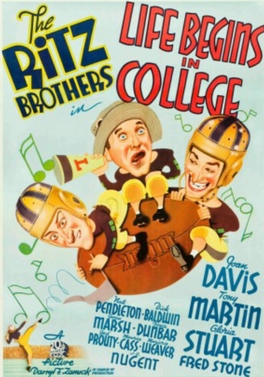
Life Begins in College is a 1937 American comedy film directed by William A. Seiter. It marked the Ritz Brothers' first starring role in a feature film.
The 66th Writers Guild of America Awards honor the best film, television, radio and video-game writers of 2013. The television and radio nominees were announced on December 5, 2013. Film nominees were announced on January 3, 2014. All winners were announced on February 1, 2014, at the JW Marriott hotel in the L.A. Live entertainment complex.

Warren Reynolds "Ray" Walker was an American actor, born in Newark, New Jersey, who starred in Baby Take a Bow (1934), Hideaway Girl (1936), The Dark Hour (1936), The Unknown Guest (1943) and It's A Wonderful Life (1946).

















